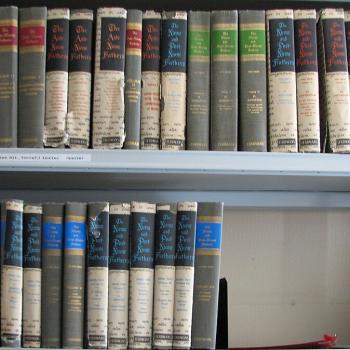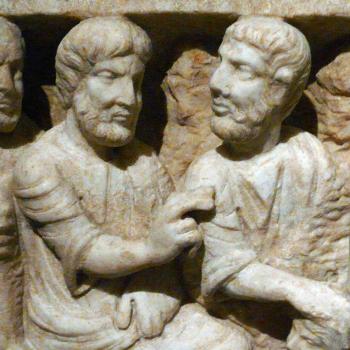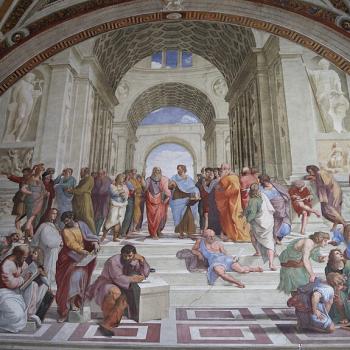
Near the end of his life, St. Thomas Aquinas had a mystical experience. He had an encounter with God which literally left him speechless. It shook up to the core of his being. He felt that what he had written, in relation to what he learned from it, was meaningless, useless straw which was worthy of being put to flames. He didn’t want to write any more, and despite the pleas of friends and colleagues, he did not finish his greatest work, the Summa Theologica.
Indeed, though his theological work was left undone, it is in this state which he best presents the mystical experience he had. For in such action, he demonstrated another theological principle: no human system, no human construct which tries to establish the fullness of truth is capable of doing so. All such systems remains conventions serve us in our search for meaning, giving us some little understanding of truth, but they cannot in and of themselves, comprehend the truth. Any such attempt is doomed to failure. And St. Thomas, thanks be to God, was able to see such and embrace such failure by allowing his work to never be complete. It served, therefore, as his final lesson to his readers, warning them against taking too much stock in the words, in the construct which he created.
If he attempted, and indeed, seemed to present a complete system, its closed-ended nature would have made it more difficult for others to embrace it. Its failings would be more evident, and the nuances of his words, of his philosophical system would become more important than what he intended to teach. For when a closed system is presented, it encourages others to look about, knock it around, and find a way to dismantle it in order to present their own little system. But here, being open-ended, he gave his readers more flexibility and freedom to complement with their own theological intuitions instead of feeling trapped within the confines of a closed-ended system. Instead of feeling the need to look around and find where it falters, his readers are encouraged to look around and find what they can lift and use, and work together instead of in contradiction with the Angelic Doctor.
Now, we must not take Thomas’ own words literally, that is, we must not take his words so as to suggest he felt there was nothing good or accomplished by what he had written. Instead, his words indicate that he was concerned with the way his students, those who would come after him, would take his works, as if the letter of what he said, instead of the spirit of what he wrote, was most important, as Simon Tugwell properly explained:
The comment that all he had written seemed like straw should certainly not be taken as a belated realization that is life’s work had been a waste of time. He had always maintained that the object of theology is God, not talking about God; but in this life we cannot approach God except by using words. “Straw” is a conventional image for the literal sense of scripture, which is worth having, even if it is only a beginning. Words can lead us to reality. [1]
This goes back to the notion, found in Scripture itself, that we are to seek the spirit of the text, not the letter, because the letter leads to the dead end found in the confines of the words, while the spirit points beyond the words to what the words intend to mean:
Such is the confidence that we have through Christ toward God. Not that we are competent of ourselves to claim anything as coming from us; our competence is from God, who has made us competent to be ministers of a new covenant, not in a written code but in the Spirit; for the written code kills, but the Spirit gives life (2Cor. 3:4-6 RSV).
The Spirit gives life, not just to Scripture, but to theology itself. This is especially true for the works of St. Thomas Aquinas. So long as we are caught into the letter of a particular text, and focus on the narrow confines of the text instead of what the Thomas intended to teach, we will eventually find ourselves stuck in a theological dead end. There is, to be sure, value in exploring the letter, of what can come out of it, but it is the beginning, not the end of the task: if the letter fails to attain its goal, then the letter itself should be “put to flames” and we seek another, better way to address the meaning Thomas intended.
Sadly, after Pope Leo XIII promulgated the encyclical Aeterni Patris, where the philosophical works of St. Thomas Aquinas were promoted as an ideal, many would-be followers of Thomas went directly towards a study of the words, and the letter of the text, ignoring the spirit behind it. They got caught up in promoting the littlest of nuances which can be brought forth from St. Thomas’ system, trying to close it in on itself, instead of working with the spirit of the text and complementing it with the vitality the text needed to continue to be relevant to us today. The way St. Thomas was willing to explore and gain from anyone, even those he opposed (such as Muslims), is lost by many a would-be Neo-Thomist who would forbid anyone following his method because it leads to conclusions outside of the dead letter of his system. Pope Leo XIII was right to recommend Thomas as a great, central example of Christian Philosophy and Theology done right, but in doing so, so many misconstrued Thomas and tried to take out of the flames that which Thomas confined to them. Neo-Thomists should listen to Copleston, when he wrote:
To claim that Thomism is a balanced philosophy involves claiming that it is capable of doing justice to different aspects of reality without turning one aspect into the whole. But it does not involve the claim that the integration of philosophical truth was finally accomplished by Aquinas. And there is at least one sense in which the Thomist himself can say, ‘We cannot go back to the Middle Ages; we cannot go back to Aquinas’. If we are considering Aquinas’ philosophy from its purely historical view, the fact that he said this or that is obviously of prime importance. But if we are considering Thomism as a living and developing philosophy, it is the philosophical positions themselves which count, and the fact that Thomas Aquinas held them in the thirteenth century is not strictly relevant [2].
Thomas offers much to us. There is every reason for us to be interested in what he can teach us. He is one of the brightest, wisest of teachers. But we should seek what we can learn from Thomas, not just in and through the letter of his text, but in what lies behind it, the method which he used, which brings us to wisdom like it did for him. We should follow with his method and take in truth wherever we find it and adding it to our own theological and philosophical reasoning, instead of staying focused upon and continue to preach a particular text which is dead and worthy of being thrown into the flames. Sadly, I find many Thomists, instead of following Thomas in his method, find themselves more concerned with the straw than what Thomas wanted us to learn from him. This is why I am sad when I see so many quoting Thomas as if he answered all questions and his words stops all debates. He didn’t, and they don’t.
This is why I have said to others that I believe there are two different kinds of Thomists, one which I find dangerous, and the other I readily applaud and respect. The first is those who follow his words, and the second are those who follow him in his actions. The first, I find, idolize every word he wrote and try to gather life from the dead letter, while the other understand his wisdom and so like him burn the words to get the proper meaning out of them and have life. Let us never fall for the trap which the first group of Thomists have set upon themselves, and instead embrace Thomas with the constant pursuit of truth, recognizing, like him, that in the end, the best presentation of truth can be found in silence.
[1] Simon Tugwell, O.P., “Aquinas: Introduction” in Albert & Thomas. Selected Writings. trans., ed. and intr. Simon Tugwell, O.P. (Paulist Press: New York, 1988), 266.
[2] F.C. Copleston, Aquinas (Baltimore, MD: Penguin Books, 1963), 254.
Stay in touch! Like A Little Bit of Nothing on Facebook:
A Little Bit of Nothing

















